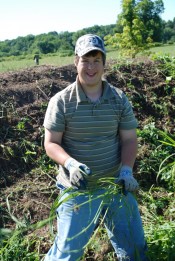 The Journey is Everything
The Journey is Everything Roadmap to Literacy Books & Courses
Roadmap to Literacy Books & Courses Middle School Science With Roberto Trostli
Middle School Science With Roberto Trostli Transforming Voices Worldwide
Transforming Voices Worldwide Summer Programs - Culminating Class Trips
Summer Programs - Culminating Class Trips Full-Time Teacher Education
Full-Time Teacher Education Bay Area Teacher Training
Bay Area Teacher Training
 Jamie York Books, Resources, Workshops
Jamie York Books, Resources, Workshops Immersive Academics and Arts
Immersive Academics and Arts Flexible preparation for your new grade
Flexible preparation for your new grade Waldorf-inspired Homeschool Curriculum
Waldorf-inspired Homeschool Curriculum Everything a Teacher Needs
Everything a Teacher Needs Train to Teach in Seattle
Train to Teach in Seattle Association for a Healing Education
Association for a Healing Education ~ Ensoul Your World With Color ~
~ Ensoul Your World With Color ~ Waldorf Training in Australia
Waldorf Training in Australia Caring for All Stages of Life
Caring for All Stages of Life Quality Education in the Heartland
Quality Education in the Heartland Space speaks. Its language is movement.
Space speaks. Its language is movement. Great books for Waldorf Teachers & Families
Great books for Waldorf Teachers & Families Apply Today: New Cohort Starts Nov. 2025
Apply Today: New Cohort Starts Nov. 2025 Bringing Love to Learning for a Lifetime
Bringing Love to Learning for a Lifetime
Would you like to become a sponsor?
Waldorf News

Peer Communities Prepare Students with Special Needs for Life and Employment after Graduation
September 3, 2012
Picture yourself as a young adult finishing high school, preparing to take your next steps in the world. What opportunities await you? Which college or vocational program will you consider in order to continue learning and developing the skills necessary for a responsible adult life? High school graduation also marks a special milestone in the lives of young people with special needs, yet it can be a challenge for these individuals to find community programs that offer a college-like experience and meet the needs of developmentally disabled “emerging adults.” By age 21, the range of support for individuals with developmental disabilities found in the public school system comes to an end. At a time when their peers are embarking on an exciting yet challenging college experience, there can be very little for young adults with special needs to look forward to. Most of these individuals will not be prepared to live independently and will find themselves at home with Mom and Dad, relying on their parents to create a circle of friends to keep them stimulated and locate meaningful activities to occupy their days. And while group homes allow young adults to live apart from their family as college does, these residential situations rarely offer true peer to peer learning. Options for continuing education, vocational exploration and genuine social relations are often less plentiful than parents might hope. More »

Missing Matthew
September 3, 2012
After Andy and I returned from the scene of my public breakdown, the phone was ringing again. I hoped it wasn't my clueless friend calling back. "Hello, Laura? This is Andrea at Camphill." Andrea was Matthew's housemother. I panicked. "Is everything OK? Did something happen?" I asked. "Oh no," she laughed. "Things are going well here. I am really enjoying Matthew, but I have some questions about him, and I hope you can help me." My heart jumped. Yes! I can help! What do you need to know? "What are his favorite foods," she asked. "Does he like music? How do you reward him for good behavior? He has been teasing his roommate relentlessly." That's a good sign. At least I know he's feeling like himself. "Any ideas? The rash that was on his hands seems to have cleared up since you left, and he is sleeping well. We are enjoying him so much! Andrea told me that Matthew liked to watch her son, Joe, who was eighteen, work in the greenhouse and that they got along well." I felt overwhelmed with joy and relief. Matthew was still far away, but he was safe, he was happy and he was appreciated. We talked for almost a half hour, mother to mother, and I told her to call me any time. It occurred to me that I had felt I was a failure as a mother because I couldn't fix Matthew. But now Andrea was acknowledging that Matthew was a puzzle, and that we needed each other to figure him out and help him grow. More »

What Ails Us? - Gabor Maté Challenges The Way We Think About Chronic Illness, Drug Addiction, And Attention-Deficit Disorder
August 27, 2012
First we need to do away with the behavioral understanding of children, which dominates parenting in North America. We insist on looking at the behavior of the child and asking, “Do we like this or not?” If we don’t like it, we try to change the behavior. But we rarely ask, “Why is the child behaving this way?” The behavior is a symptom, a secondary issue. The real task is to understand what is actually bothering the kid. The child doesn’t necessarily understand it himself. It’s not his job to understand it. It’s the parent’s job, the teacher’s job, the doctor’s job, the psychologist’s job. As long as we restrict ourselves to either punishing or curtailing children’s behaviors, it’s like giving an asthmatic cough medicine: it might suppress the symptom, but it does nothing about the inflammation that’s causing it. If a child’s “acting out” is a result of a disturbed attachment relationship to her parents, to punish the behavior only further wounds the child, who didn’t deliberately choose that behavior and has no idea why she’s being punished for it. It’s in relationships that people develop the coping mechanisms that may later make them sick. If my relationship with my parents demands that I become their caregiver because they’re alcoholics, then I’ll likely become a chronic caregiver and will ignore my own needs. The children of alcoholics suffer a lot from anxiety, depression, and physical illness because of how they cope. But they had no choice but to cope that way. More »

"Your Teachers Think Day and Night About What Your Future Will Be Like" - Rudolf Steiner's Words to the First Waldorf School Graduates
July 21, 2012
After our graduation, our class asked Rudolf Steiner for advice about what professions and trainings we might choose. Some time later he said that it was not easy to advise a Waldorf student on this because Waldorf schooling would have awakened such a wide range of interests that he could see many possibilities. We gathered on April 10, 1924, filled with the highest expectation in the teachers’ room, for this requested meeting. Seventeen students, eight girls and nine boys, sat around the big table that took up most of the room, while our teachers were sitting along the walls. A kind of feeling took hold of us all, as one experiences before making important life decisions, and all eyes were directed toward Rudolf Steiner who had taken his seat at the head of the table. It was very quiet when he addressed us in his calm, full voice. As we had asked for this gathering, he said, we should now say what we had in mind, and it would be best if we spoke one after the other. He asked the girl closest to him to begin. We now listened with amazement to the intimate dialogue that developed between each pupil and Rudolf Steiner—very factual, almost sober, with a hint of humor here and there. More »

50 Instruments That Will Melt Your Heart
July 19, 2012
The years between 2003 and our current moment have seen the evolution of the flash mob: from cheeky, satiric events to gatherings that are deeply rehearsed and occasionally — inevitably — commercial. (Even the Sabadell video is commercial: Its performance was convened to mark the 130th anniversary of its Banco Sabadell.) But this mob, and this particular “Ode to Joy,” are something else: a crowd that comes together not primarily to make a point, but simply to make music. Together. More »
 Recent Jobs
Recent Jobs
View more jobs »
 Newsletter Archive
Newsletter Archive
 Join the Mailing List!
Join the Mailing List!
Stay Connected…
Each week receive the Waldorf News Weekly Update, full of news, events, and more. Keep abreast of what's happening with Waldorf education.
 RSS Feeds
RSS Feeds